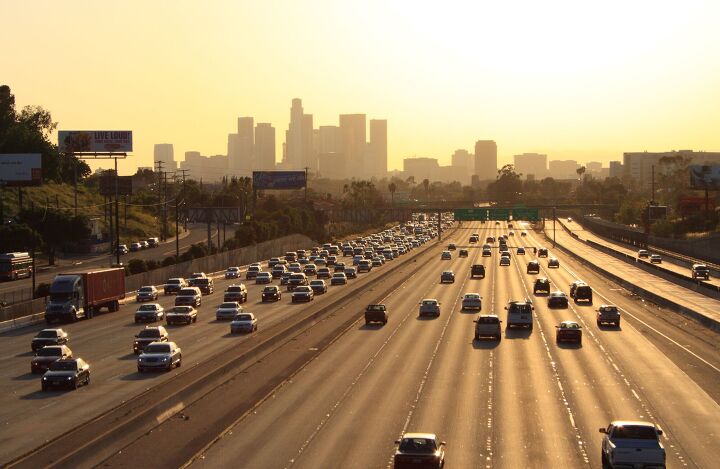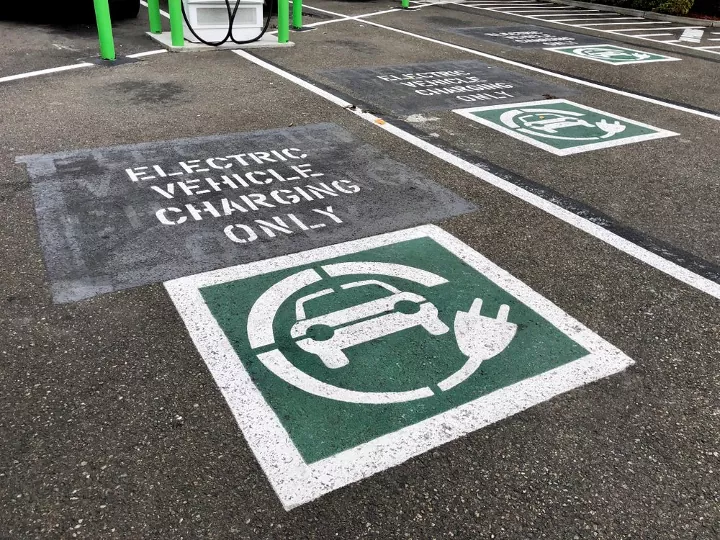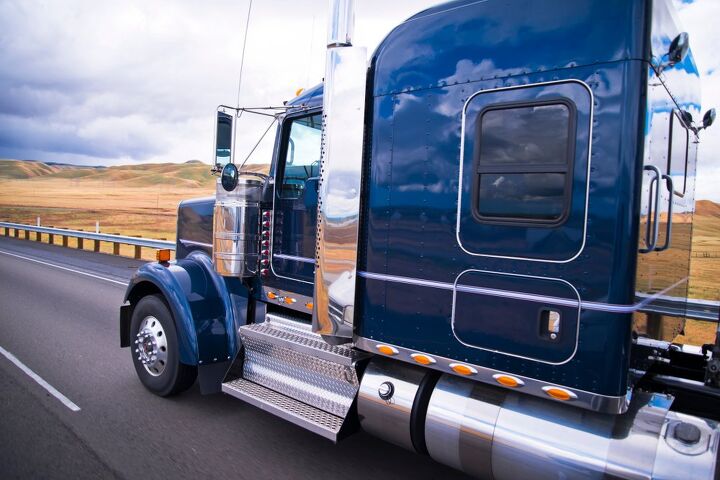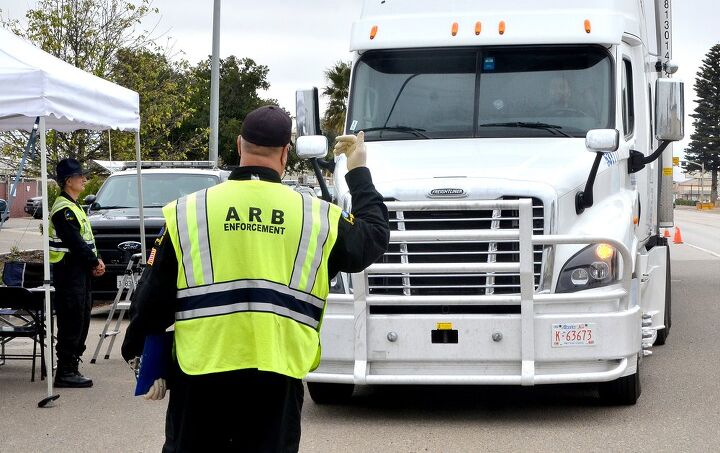#CARB
Gas War: Appeals Court Upholds EPA Approval of California Emissions Rules
On Tuesday, a U.S. appeals court agreed to uphold the Environmental Protection Agency's decision to re-grant a waiver that allows California the ability to set its own tailpipe emissions limits and electric vehicle mandates.
Gas War: U.S. House Suggests Ending California Emissions Authority, White House Says Nope
On Tuesday, the White House voiced its opposition to a Republican bill scheduled to be voted on by the U.S. House of Representatives that would prevent California from receiving federal waivers to set standards limiting the sale of gasoline-driven automobiles.
Stellantis Limiting Availability of Gasoline Models by State Emission Rules
Stellantis is reportedly no longer allocating gasoline-only vehicles to the fourteen states with leadership that has agreed to adhere to the emission standards set by the California Air Resources Board (CARB). While the rules exceed federal standards, they’ve been embraced by coastal regions and beginning to influence how the industry does business.
For Stellantis brands (e.g. Alfa Romeo, Chrysler, Dodge, Fiat, Jeep, Ram, etc.) this means dealer allocation will prioritize powertrains based on how restrictive the local emissions standards happen to be.
California Officially Bans Pre-2010 Diesel Trucks, Buses
In 2008, the California Air Resources Board (CARB) approved legislation designed to curtail emissions from older trucks and buses operating within the state. Known as the “Heavy Duty Vehicle Greenhouse Gas Emission Reduction” measure, the law originally called for long-haul truckers to install specialized tires and aerodynamic devices on their trailers that improved fuel economy. However, it’s gone through numerous updates over the years, eventually making it illegal to even operate certain vehicles equipped with the wrong kinds of engines. The latest update bans any truck with a gross vehicle weight rating (GVWR) over 14,000 pounds using an engine manufactured before 2010.
Gas War: California Finalizes Combustion Ban Plan
The California Air Resources Board (CARB) is supposed to vote on stricter rules that will ban the sale of new gasoline-powered cars by 2035 later today. But we already know what the results will be because the organization is about as mentally homogeneous as a eusocial insect colony and is strongly supported by the state government. So let’s cut to the chase and hear what California has to look forward to before seeing what kind of combustion bans are taking place in other parts of the world.
NHTSA Boss Leaving to Head California Air Resources Board
The National Highway Traffic Safety Administration (NHTSA) has had a difficult time finding permanent leadership ever since Mark Rosekind resigned in 2017. But the Senate managed to confirm Steven Cliff as administrator in May of 2022, providing the agency with some welcome but short-lived stability. The NHTSA announced that its current boss would be leaving to join the California Air Resources Board (CARB) on Friday.
Gas War: Republican States Sue EPA Over Californian Standards
Last week, a group of Republican attorneys general decided to sue the Environmental Protection Agency (EPA) over its decision to reinstate the waiver allowing California to set its own limitations on exhaust gasses and zero-emission vehicle mandates that would exceed federal standards.
The agency approved the waiver after it had been eliminated as part of the Trump administration’s fuel rollback on the grounds that it would create a schism within the industry by forcing automakers to produce vehicles that catered to the Californian market at the expense of products that might be appreciated in other parts of the country. However, Joe Biden’s EPA sees things differently and has aligned itself with the California Air Resources Board (CARB) in giving the state more leeway to govern itself in regard to emissions policing.
California Proposal Calls for 68 Percent EV Sales By 2030
Now that the U.S. Environmental Protection Agency (EPA) looks poised to reinstate California’s waiver under the Clean Air Act — allowing the state to establish stricter tailpipe emissions than the federal limits — the coastal region has resumed its quest to abolish gasoline-powered vehicles in earnest. While the California Air Resources Board (CARB) has yet to finalize all the details, the latest proposal calls for strengthened emissions standards for new light-duty vehicles in anticipation of the necessary approvals.
The scheme would require pure electrics and plug-in hybrids (PHEVs) to make up 35 percent of new-vehicle sales for the 2026 model year. By 2030, that number will become 68 percent before hitting 100 percent for MY 2035. CARB said zero-emission vehicles comprised 12.4 percent of the state’s new market in 2021, hinting that the number could have been higher without the Safer Affordable Fuel-Efficient (SAFE) Vehicles Rule Part One having stifled its progress.
Gas War: EPA Reinstates California's Ability to Set Emission Limits, EV Mandates
The U.S. Environmental Protection Agency has opted to reinstate California’s ability to set tailpipe rules and zero-emission vehicle mandates that are more rigid than federal standards. After quarreling for years over the Trump administration’s decision to roll back Obama-era fueling standards deemed untenable, the Golden State now has the ability to once again make harder for its citizens by forcing them to purchase the kind of vehicles it feels they should be driving — rather than leaving it up to the individual that’s actually buying the car.
Though it might not matter at this point. While California effectively served as a defensive shield against proposed fueling rollbacks while Trump was in office, the Biden administration strategy is broadly in line with its agenda of making gasoline unappetizing to consumers to ensure a speedy transition to electric vehicles. California doesn’t even want people to have access to gas-powered lawn care equipment. The state has effectively served as a test case for Build Back Better since before the phrase passed through the lips of a single politician.
Gas War: GM Now Sucking Up to California to Maximize Fleet Sales
General Motors has issued a letter to California Governor Gavin Newsom promising that the automaker is now fully committed to complying with the state’s aggressive emission regulations. This follows an earlier announcement from GM advancing plans to eliminate tailpipe emission from all light-duty vehicles by 2035 via electrification. The company had also increased global spending to develop EVs to $35 billion (USD) through 2025, which is roughly a third more than it had previously been targeting.
Of course, don’t think this has anything to do with altruism or formal commitments to some grand cause. California was simply planning to bar any automakers that hadn’t previously vowed to adhere to its strict regulatory policies from selling to state government fleets. While GM has been in the process of changing its allegiance, the business originally sided with automakers approving of the Trump administration’s regulatory revisions that were at odds with the region.
Gas War: California May Ban Gas-Powered Lawn Equipment
The California Air Resources Board (CARB) has decided that residential lawn equipment is a major problem. Claims have been made that the small engines found inside of the average leaf blower emit the same amount of smog-forming pollution in a single hour as a 2016 Toyota Camry could produce over a 1,100-mile drive.
Assertions like these have been used to forward Assembly Bill No. 1346, which requires the board to define and then pull the trigger on new regulations designed “to prohibit engine exhaust and evaporative emissions from new small off-road engines” by 2022. CARB then has to decide whether or not it can outright ban them, so they may be replaced by zero-emission equivalents after 2024. Considering how decent most electrified tools have grown to be, this doesn’t sound infeasible. But it’s another example of California’s obsessive hatred of consumers utilizing liquid fuel and bound to have major ramifications.
Judge Approves Daimler AG's $1.5 Billion Diesel Emissions Settlement
On Tuesday, a federal judge approved a $1.5 billion settlement to pump the brakes on an investigation conducted by the U.S. government pursuing claims that Daimler used illicit software that allowed excess diesel emissions on 250,000 units. This runs in tandem with another $700 million settlement the automaker is making with vehicle owners, which is likely to see final approval in a few months, and an extensive recall campaign.
The federal case involves the U.S. Justice Department, the California Air Resources Board, and follows a trend of fines for automakers accused of misleading regulators so that diesel vehicles could continue being sold. This kicked off with Volkswagen’s Dieselgate in 2015, with numerous government probes taking place in Europe and North America over the next five years. Many automakers have since been discouraged from relying on diesel powertrains due to rising regulatory actions. European countries that once championed the fuel as ecologically preferable to gasoline, after the advent of biodiesels, are now obsessed with tamping down NOx emissions and getting more electric vehicles onto the road.
California Wins the Gas War, Fickle Automotive Coalition Realigns Position
The Coalition for Sustainable Automotive Regulation (CSAR) is officially withdrawing from a lawsuit between California and federal authorities over the coastal state’s ability to establish its own emissions standards. California leadership had vowed to ignore the Trump administration’s proposed rollback and began making binding side deals with automakers (specifically BMW, Ford, Volkswagen, Volvo, and Honda) committed to adhering to the aggressive limits established under President Obama. Unfortunately, this ran the risk of undermining the revised national standards penned shortly after the United States became energy independent. It also set up the CSAR to embrace any entity that had views conflicting with California Air Resources Board.
Federal concerns were that the Golden State setting its own targets would butt heads with the relaxed national benchmarks and ultimately divide the U.S. market and may even influence the types of vehicles that were manufactured for all of North America. But the issue became moot once President Biden broke the record for executive orders by signing 22 in his first week. Predictably, the brunt of these were designed to instantly undo any actions taken throughout the duration of the Trump administration and included one directing the Department of Transportation and EPA to reconsider the 2019 decision to remove California’s authority to limit tailpipe emissions by April and revise the fuel-efficiency standards for automobiles by summer.
Gas War: Ford Urges Other Automakers to Join the Californian Coalition
The Ford Motor Company is asking automakers to join it in supporting Californian vehicle emissions targets aimed at supplanting the rollback that was supposed to become the national standard. General Motors has already abandoned its support of the Trump rollbacks, which offered concessions to appease environmental groups but ultimately targeted more lax fueling regulation while seeking to eliminate California’s ability to self regulate as a way to curb its influence. But industry leaders are under the impression that a President Biden would attempt to swiftly transmission back to Obama-era regulatory targets or simply adopt the California model that’s been at odds with the national standards established by the Trump administration.
Considering how aggressive the Biden-Harris energy/environmentalism platform is, it certainly seems a plausible scenario and certain automotive executives feel that it would be best to go into 2021 aligned and supportive. The matter is even scheduled to be brought forward during Tuesday’s virtual auto trade association meeting.
Gas War: California Regulators Say Biden Should Embrace State's Emission Plan
While multiple states launch mandatory election recounts and President Trump throws around lawsuits like confetti Joe Biden and the mainstream media are preparing for his ascension from regular old man to Leader of the Free World — though that title doesn’t seem to get much play these days. Biden has already started holding meetings with foreign leaders and experts on how to go about heading the United States. Apparently, there’s even been some progress on how to govern the nation.
On Thursday, California Air Resources Board (CARB) Chairwoman Mary Nichols said the state’s arrangement with major automakers over fuel efficiency requirements would be ideal for the presumed Biden administration — which has promised to implement some of the most ambitious emissions standards the world has ever seen. Nichols also expressed excitement at the possibility of heading the U.S. Environmental Protection Agency (EPA) under a Biden presidency and is reportedly under serious consideration for the position.





























Recent Comments